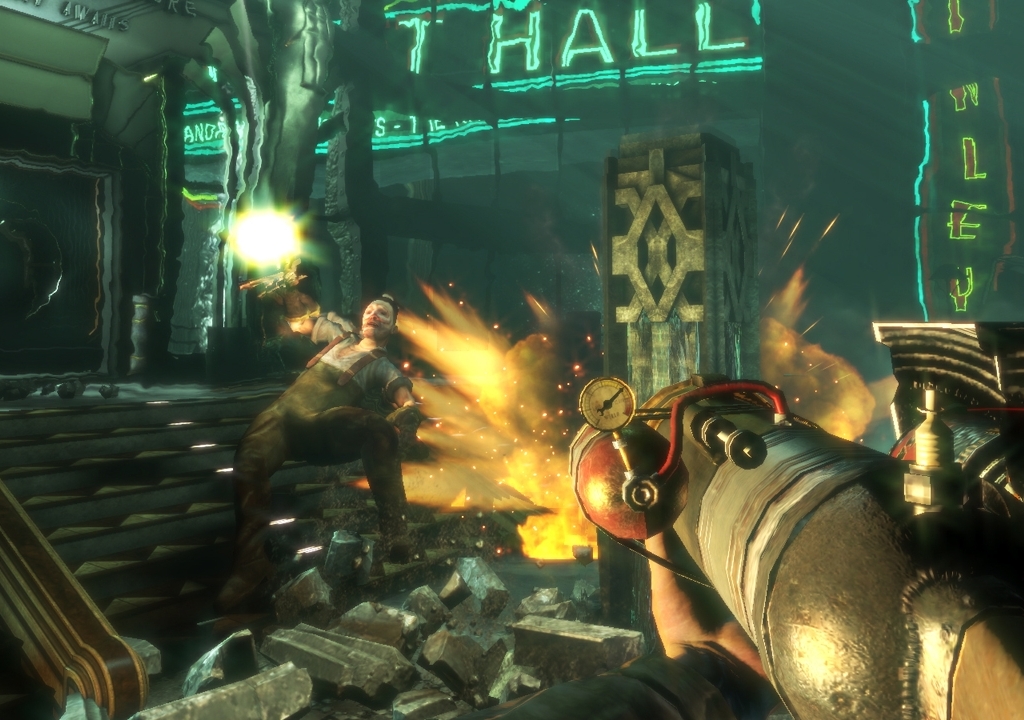This post has not been edited by the GamesBeat staff. Opinions by GamesBeat community writers do not necessarily reflect those of the staff.

As Taylor Clarke points out in this now-infamous Kotaku piece, you aren’t treated to a whole lot of depth in your average video game. You’re probably just running around shooting lasers at aliens, or navigating an environment while you punch people until they die. This is the story and nothing else matters.
Character motivation, narrative arcs, and philosophical dialogue all become a muffled whisper to the player's psyche against the deafening roar of what you're actually doing onscreen.
Ken Levine claims that Bioshock is about "human nature," but the only message echoing in your brain is "Shoot, shoot, and burn the psychos, shoot, shoot, electrocute the monsters."
I have no doubt Levine is one of the brightest and most intelligent storytellers in any medium, but adding something “smart” to a video game is like putting Yo-Yo Ma on stage with Rammstein and wondering why the metal-heads crowd the mosh pit and the cello enthusiasts leave in disgust.
I am inclined to agree with Matthew Burns in that adding a "better story" to a game about shooting aliens is as dissonant as overlaying Mozart to a Jackass movie. Like watching Steve-O snort wasabi set to a stirring violin, "it is extremely difficult — maybe impossible — to come up with a story and characters that, when placed within the context of most current video games, don't feel inherently silly."
I read the previews for Spec Ops: The Line, an ambitious new title that aims to be one of the "smart" games that Clarke yearns for, and was intrigued. Creative lead Cory Davis sums up the vision as "hyper-realistic, but emotionally authentic." The IGN preview explains how Davis is striving for that: Every enemy speaks and yells like a real soldier, military experts mo-capped the correct usage of a shotgun, and there will even be a moving story. Actual writers are painting a narrative of horrific torture situations, heroic rescues, and the human soldiers who live through them. There is no reason to think these professionals and visionaries are not capable of creating an interactive Heart of Darkness. The equation is in place for the "smart game" we’re looking for.
Except that Spec Ops: The Line is still another big, loud, and especially dumb game…but it may not be anyone's fault except the medium of video games itself.
During the recently released demo, I earnestly tried to keep the story and the vision alive. I was tuned into the whispering good intentions of so many smart people, but then the violins began to drown underneath the "bang, bang, kill the bad men, bang, bang, reload."

I had come for Yo-Yo Ma, but all I could hear was "Du Hast" screaming over my speakers.
Davis acknowledges his medium is different, but he doesn't understand why: "I think we have a really huge opportunity to use interactivity to spark certain emotions and thoughts in the player that other mediums don't necessarily have and can't explore in the way we can…."
He has incorrectly attributed the wrong strengths and weaknesses to video games. He is assuming that interactivity creates stronger emotions, but he then talks about pushing the narrative. This is the biggest sin of smart people: They create dumb games because they don't understand their medium.
Journey's creator Jenova Chen is a rarity among developers. He chooses to push and revolutionize gameplay — rather than narrative — to introduce emotions and thoughts in the player that other mediums would not be able to. Chen is a smart person creating smart games, and Simon Parkin's interview explains why: Journey's emotional impact was the result of not a narrative decision, but a gameplay decision. When he removed collision-detection between players, people begin to look for other ways to give feedback to each other. Namely, they began to help one another.
That's how video games are unique to film or television, and that's what Davis, Levine, and other well-meaning people fail to understand. Until they do, expect to see more dumb games from smart people.
